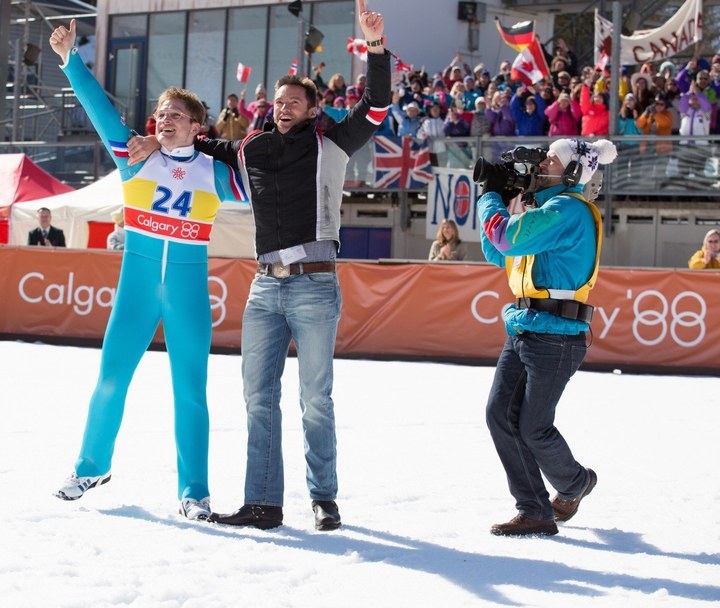
Taron Egerton and Hugh Jackman in Eddie the Eagle.
Larry Horricks / Twentieth Century Fox
At the 1988 Calgary Winter Olympics, Eddie "The Eagle" Edwards became a star — not because he was good at ski jumping, but because he was, by the admittedly high standards of the games, fucking terrible at it.
Edwards was a downhill skier who'd switched sports only two years earlier because he wouldn't need to fight for a place on the U.K. ski jumping team, as the U.K. ski jumping team did not exist. Most competitive ski jumpers train seriously from when they are children, but Edwards started in his twenties. He weighed 20 pounds more than the average competitor, wore thick glasses, and was prone to pratfalls. He became a crowd favorite despite (or due to) coming in last in both the 70-meter and 90-meter ski jumps, but has, until now, also come up short in the race to the Cineplex.
The Jamaican bobsled team, also 1988 Olympic long shots, became the basis of Cool Runnings back in 1993, while Edwards' story has languished in development for years. First Steve Coogan was set to take the role, then Rupert Grint, before dreamboat Taron Egerton put on vintage specs and a hint of baby fat to play the man one journalist reportedly labeled a "ski-dropper."
Hugh Jackman and Taron Egerton in Eddie the Eagle.
Larry Horricks / Twentieth Century Fox
And watching the candy-sweet Eddie the Eagle, which was directed by Dexter Fletcher and written by Sean Macaulay and Simon Kelton, you can see why Edwards' tale took longer to bring to the screen. The Jamaican bobsledders, like other underdog favorites including Equatorial Guinean swimmer Eric Moussambani and American Samoan sprinter Trevor Misipeka, were people who'd come from outside the traditional systems of their sports. Edwards, for all that the movie plays up his ungainliness, was already a competitive athlete — it wasn't greatness in his sport that he was after, but a more general moment in the Olympics spotlight, a motivation that's a little less winsome. He's being sold hard here as an inspirational figure, but it's not a role he seamlessly fits into.
In fact, Eddie the Eagle floats various morals we're supposed to take from its story. At one point it's about chasing dreams, no matter what, and then it's about how Eddie wants to prove himself to his doubters, including his pragmatic father (Keith Allen). Then it's about being a working-class interloper in an upper-crust sport, and then it's about guts — "I'd rather be a sober fool than a drunken coward," Eddie yells at his reluctant, alcoholic, former champion of a coach, a fictional character named Bronson Peary, played by Hugh Jackman. Then, it's about reclaiming the Olympics for the amateurs, and then, right at the end, it's suddenly about having a pure relationship with a ski jumping that has nothing to do with competing.
The overkill indicates an awareness that none of these would-be messages ring true — Eddie's spending money his parents don't have on implausible goals; his fellow athletes are scoffing bullies from no obvious background other than Norway and a meaner part of England; his brave choices could be equally described as stupidly dangerous; "amateur" isn't synonymous with lacking skill; and ski jumping isn't even his first pick.
Jackman and Egerton.
Larry Horricks / Twentieth Century Fox
What Eddie is — which Eddie the Eagle resists fully acknowledging — is a viral star before the age of the internet, a man whose real talent is winning over the crowd. His excitement over landing his first jump in Calgary, dancing for the cameras and flapping his arms, is perfectly GIFable. His determined face, chin forward, as he heads down the jump looks eerily like that of Success Kid. He becomes a press conference darling — "he's a PR dream," the U.K. publicist trumpets — while other members of the team get shunted to the side, because he's the one who makes for better copy.
When Eddie's told he'll be forgotten once the games move on to the bigger 90-meter jump, he decides to compete in that event as well, despite never having done one before. It's supposed to be a triumphant moment, but instead it feels callous — "I didn't come here as a novelty act," Eddie tells the press. But of course he did, or, in less cynical terms, he came as a human interest story, a meme, a young man who, via outdated rules, wormed his way into the most competitive sporting event in the world, all the while insisting it wasn't about who won or lost.
Someone with a gift for puncturing his characters' own grandiosity, like Coogan, might have found tragicomedy in Eddie, but Egerton plays him totally straight, with a Forrest Gumpian air of innocence that feels, at the end, like a bit of a put-on. Edwards wasn't a fool, and he rode out his unexpected renown by releasing two songs in Finnish (which he didn't speak), participating in reality shows, and appearing in ads, like plenty of other Olympians trying to wring as much as possible from every-four-years fame.
As Eddie is scorned by Olympic officials for not being the highly trained type who attracts sponsors, it's hard not to think about how he's actually got a more developed personal brand than anyone else on the team. Who needs a medal when you can be a star?

No comments:
Post a Comment